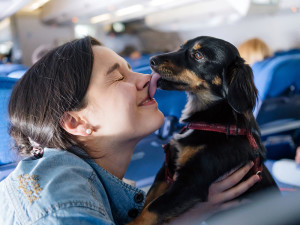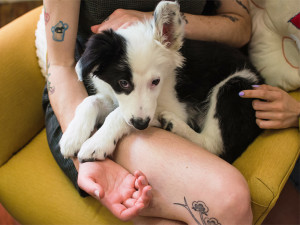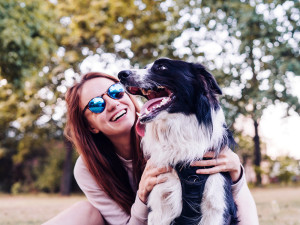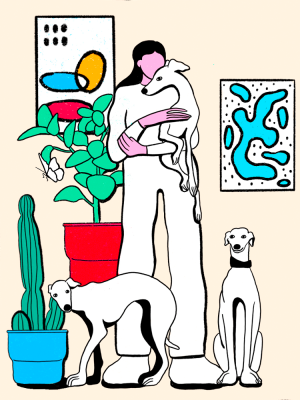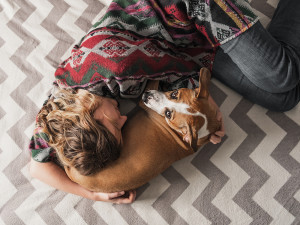Can Dogs Sense When You’re Sad?
It certainly seems like it sometimes.

Share Article
In This Article:
Can Dogs Sense Sadness? How Dogs Respond to Emotions How Dogs Comfort Sad Pet Parents The Canine and Human Bond
Ever notice how your pup seems to know exactly when you need a pick-me-up? Dogs have this uncanny ability to tune into our emotions, almost like they have a sixth sense for what’s going on in our heads and hearts. From wagging tails to cozy cuddles, they’ve got a whole repertoire of comforting moves up their furry sleeves. But how do they do it? Turns out, our canine companions aren’t just good listeners — they’re emotional experts, too.
Research shows opens in new tab that dogs use a combination of visual and auditory cues to understand how someone is feeling, and they can decipher between positive and negative emotions. Essentially, they can pick up on our vibes, whether we’re feeling on top of the world or a bit down in the dumps. Let’s take a deep dive into the fascinating science of dog emotions and what you can expect from your caring companion when you’re in your feelings.
Can dogs sense when you’re sad?
Dogs use their keen senses to read our moods and emotions, including when we’re sad. They pick up on subtle cues in our body language and tone of voice, allowing them to detect when something’s amiss.

“No one questions when a dog gets excited when we get excited,” says Robert Haussmann, Certified Trainer, Canine Behavior Consultant, and co-founder of Dogboy NYCopens in new tab. “If we’re sullen, sad, or crying, those are behaviors that are not unique to us. Depending on your bond and relationship with your dog and their age, they can sense a wide range of emotions.”
If you’re feeling upset and notice that your pup is acting differently, it’s because they can likely sense the shift in your mood. Our canine companions are constantly observing us and responding to our emotions, so whether you’re happy, sad, or anxious, any change in your emotional state may be reflected in your dog’s behavior.
How dogs respond to human emotions
When we look into the science behind a dog’s response to our emotional state, we discover that humans and animals share similar emotional and neurological mirroring systemsopens in new tab, which allow us to connect and understand one another. These mirror neurons in a dog’s brain fire both when they perform an action and when they observe a human performing the same action. This neurological system is linked to social behaviors like empathy and learning by imitation.
“Dogs and humans have this unique evolutionary history,” Haussmann says. “Dogs came in when we stopped being nomads. We have co-evolved for a very long time, and it doesn’t surprise me that dogs will respond to your emotional state.”
The way your dog responds to you being sad can vary, but you may see some peculiar behavior, such as licking or avoidance.
Why does my dog lick me when I’m sad?
You may notice when you’re sad your dog starts to lick you. Licking is often their way of offering comfort and support, similar to how they might comfort each other within their own pack. It’s their way of saying, “I’m here for you, and I want to make you feel better.” So, when your dog licks you while you’re sad, it’s their way of trying to cheer you up and show you some love.
Why does my dog avoid me when I’m sad or crying?
While some dogs lick their pet parents to provide comfort when they’re sad, others might react differently. Some dogs will sense our sadness and choose to give us space, as they may pick up on the fact that we’re feeling vulnerable or upset. In these cases, your dog might avoid you because they’re unsure of how to help or because they don’t want to exacerbate your emotions. To you, it might look like your dog is sad, too, but they may just be trying to give you some alone time.
“As long as it’s not having a negative effect on them, let your dog feel their feelings,” Haussmann says. “You can by all means comfort them while they’re comforting you.”
Whether they’re licking or avoiding, it’s important to remember that each dog has a unique personality and will respond differently. Haussmann reiterates that humans can have a tendency to hijack their dog’s emotions, and it’s important to just let them be sometimes.
How dogs comfort sad pet parents
Dogs just seem to have this knack for knowing when their humans need a little extra TLC. If you’re sad, here are some ways your dog may comfort you:
Cuddling up beside you
Laying their head on your lap or chest
Licking your hands or face gently
Offering gentle nudges or leaning against you
Bringing you their favorite toy or blanket
Staying close by your side
Offering soothing, non-verbal sounds like sighs or soft whimpers
Gazing into your eyes with a look of understanding
Responding to your emotions with their own displays of affection, such as licking or putting a paw on you
Whether it's a wagging tail or a gentle paw on your lap, their presence alone can work wonders to lift your spirits and make the world feel a bit brighter.
The canine-human bond
The bond between humans and dogs is one of the most cherished and studied relationships in the animal kingdom. Dogs have long been recognized for their remarkable ability to offer comfort and support to humans during times of distress, which has led many scientists to research the concept of empathy in dogs. One studyopens in new tab reveals that dogs display empathic-like behavior when they come across a human crying, but not when they encounter a talking or humming human. While this discovery emphasizes the captivating bond between humans and canines, there are also limitations, because it’s not possible for humans to fully comprehend dog emotions.
“There’s a lot of innate magic between dogs and people,” Haussmann says. “I think we need to be careful to not put these concepts and how we’ve organized our emotions and feelings into words and language that dogs just don’t have. If we do, it can make us respond in certain ways if you feel like your dog should be empathizing with you. If you just accept that you’re sharing your house with this animal that has co-evolved with you, you can just enjoy them for who they are.”
Ultimately, whether your pup’s response to your sadness results in cuddling, licking, or giving you some space, know that they are trying their best to comfort you in their own way. There’s no doubt that we share a deep bond with our canine companions, and we can take solace in the fact that we’ve always got each other’s backs.
FAQs (People also ask):
Can dogs sense other emotions besides sadness?
Yes, dogs are remarkably attuned to human emotions and can sense a wide range of feelings beyond just sadness. Dogs can sense fear, happiness, anxiety, and even stress in their human companions. This ability is attributed to their keen observational skills, acute sense of smell, and their ability to pick up on subtle changes in body language and vocal cues.
What should I do if my dog seems distressed when I’m sad?
If your dog appears distressed when you’re feeling sad, you can try to provide them with reassurance and comfort. Offer your dog affection, cuddles, and soothing words to help alleviate their distress. Creating a calm and nurturing environment can also help reassure your dog and alleviate any anxiety they may be experiencing.
Are all dogs equally adept at sensing human emotions?
While all dogs possess some degree of emotional intelligence, not every dog is equally adept at sensing human emotions. Factors such as breed, individual temperament, and socialization experiences can influence a dog’s ability to interpret and respond to human emotions.
Do certain breeds make better emotional support animals?
Certain breeds are often favored as emotional support animals due to their calm demeanor, affectionate nature, and intuitive understanding of human emotions. However, the suitability of a dog as an emotional support animal ultimately depends on individual temperament, training, and the unique bond between the dog and their human companion.
References:
A Preliminary Work on Dog Emotion Recognitionopens in new tab
Dogs Can Discriminate Emotional Expressions of Human Facesopens in new tab
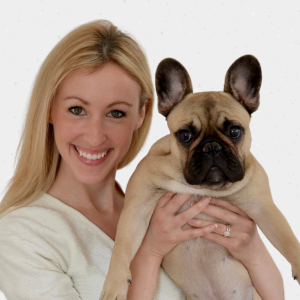
Courtney Elliott
Courtney Elliott, a proud Cleveland native living in Manhattan, blends her decade of writing and editing expertise with her unshakable devotion as a pet parent to her French Bulldog, Gus. When she’s not at her desk, you’ll find her frolicking in Central Park or engrossed in a good book at a local coffee shop.
Related articles
Do Anxious Dog Parents Raise More Anxious Dogs?
Which comes first: a nervous person or a nervous pup?
![Young woman playing with a dog outdoors stock photo.]()
Do Dogs Try and Make Us Laugh? The Internet Thinks So — Here’s What Science Says
If you think your pup’s practically George Carlin, science backs you up.
![Illustration by Zoé Coulon, a person holding a dog with two dogs beside them]()
108-Year-Old Woman Says Dogs Are the Secret to a Long Life
She says not having kids — and only dogs — is a huge contributor. Makes you think.
![A woman laying on a zig zag patterned blanket while curling around her brown and white dog]()
How Do I Register an Emotional Support Animal?
Confused about ESA rules? Here’s a comprehensive guide that explains everything.
![two people bonding and smiling over a dog]()
Loneliness Is a Public Health Crisis. Pets Can Help
Per the US Surgeon General, loneliness is as dangerous for your health as smoking 15 cigarettes a day. Here are ways pets can solve that.
![A dog laying on a couch looking relaxed]()
Is Your Dog Sad?
Or are they just peacefully resting? Behaviorist Karen London explains how to tell the difference.
![Happy young woman in yoga clothes holding small tan dog in park]()
The Healthiest Thing You Can Do Is Get a Dog, Harvard Report Says
Scientists confirm the myriad physical and psychological benefits of pet parenthood.

